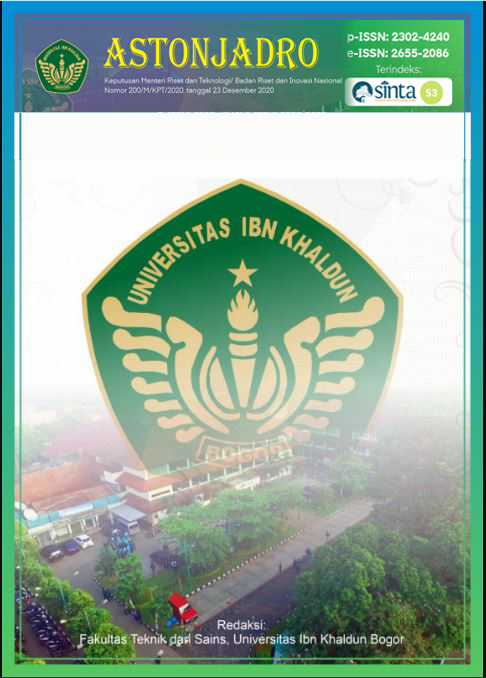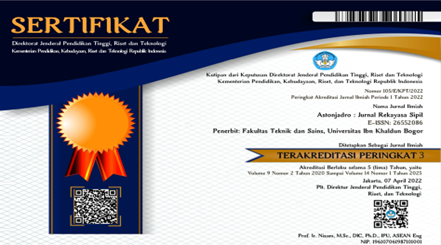Energy Audit for Energy Efficiency and Cost on Hospital Buildings
Keywords:
EUI; hospital; energy efficiency; redesign; sefaira.Abstract
Hospitals are social facilities that operate publicly for 24 hours/day. The energy consumption of hospital buildings is among the highest, compared to commercial and residential buildings. Energy efficiency can be achieved after implementing a process called energy auditing and planning. The purpose of this study is to determine the EUI (Energy Use Intensity) of electricity for energy and cost savings, without reducing the productivity and comfort of the occupants. The method used in this research is the calculation of the EUI of the entire equipment, comparison of calculating the existing EUI with the Standard, simulation of existing conditions, redesign, modeling and simulation analysis of redesign results, calculation of EUI after redesign and calculation of energy costs before and after redesign. The results of this study obtained the EUI value in the air-conditioned room on the 1st floor of 15.14 kWh/m2/month included in the category Sufficient efficient from previously Wasteful, 2nd floor of 7.53 kWh/m2/month included in the category Fully Efficient and 3rd floor of 7.97 kWh/m2/month included in the category Fully Efficient. As for the non-AC room, the 1st floor of 2.27 kWh/m2/month is included in the Fully Efficient category, the 2nd floor of 2.50 kWh/m2/month is included in the Fully Efficient category from the previous Efficient, and the 3rd floor of 2.50 kWh/m2/month is included in the Fully Efficient category from the previous Efficient. Meanwhile, the calculation of energy costs after design recommendations was obtained at IDR 976.219.477,27 decreased by 21.56%.
References
Biantoro, A. W., & Permana, D. S. (2017). ANALISIS AUDIT ENERGI UNTUK PENCAPAIAN EFISIENSI ENERGI DI GEDUNG AB, KABUPATEN TANGERANG, BANTEN. In Jurnal Teknik Mesin (JTM) (Vol. 06, Issue 2).
Doukas, D. I., & Bruce, T. (2017). Energy Audit and Renewable Integration for Historic Buildings: The Case of Craiglockhart Primary School. Procedia Environmental Sciences, 38, 77–85. https://doi.org/10.1016/j.proenv.2017.03.081
Fitriani, I., Sangadji, S., & Kristiawan, S. A. (2017). Energy efficiency evaluation of hospital building office. Journal of Physics: Conference Series, 795(1). https://doi.org/10.1088/1742-6596/795/1/012067
Hesti, T., Mahasiswa, M., Arsitektur, F., Teknik, U., & Gadjah, M. (2015). Prosiding Seminar Topik Khusus/ Juli.
Joshi, A., Khandelwal, N., Suryavanshi, Y., Broota, S., Kurulekar, M., & Dhaneshwar, P. (2023). Energy conservation: Virtual energy audit of an industrial plant. Materials Today: Proceedings, 72, 1882–1889. https://doi.org/10.1016/j.matpr.2022.10.055
Kurniawati, R., & Mamok Suprapto, dan. (n.d.). EFISIENSI ENERGI RUANG RAWAT INAP BANGUNAN RUMAH SAKIT ISLAM YARSIS SURAKARTA.
Nourdine, B., & Saad, A. (2019). About energy efficiency in Moroccan health care buildings. Materials Today: Proceedings, 39, 1141–1147. https://doi.org/10.1016/j.matpr.2020.04.135
Purnami, N. A., Arianti, R., & Setiawan, P. (2022). Analisis Intensitas Konsumsi Energi (IKE) pada Institut Teknologi Dirgantara Adisutjipto (ITDA) Yogyakarta. AVITEC, 4(2), 225. https://doi.org/10.28989/avitec.v4i2.1325
Qiang, G., Tang, S., Hao, J., Di Sarno, L., Wu, G., & Ren, S. (2023). Building automation systems for energy and comfort management in green buildings: A critical review and future directions. In Renewable and Sustainable Energy Reviews (Vol. 179). Elsevier Ltd. https://doi.org/10.1016/j.rser.2023.113301
Spudys, P., Jurelionis, A., & Fokaides, P. (2023). Conducting smart energy audits of buildings with the use of building information modelling. Energy and Buildings, 285, 112884. https://doi.org/10.1016/j.enbuild.2023.112884
Sunarto. (2018). ENVIRONMENTAL STRATEGIC PLANNING RUMAH SAKIT PERSAHABATAN MENUJU A GREEN HOSPITAL. International Journal of Educational and Environmental Education (IJEEM), 3(2). https://doi.org/10.21009/jgg.032.0101
Indonesian National Standard (SNI) 6196:2011, Energy Audit Procedures in Building. National Standards Agency.
Minister of Energy and Mineral Resources Regulation No. 13 Year 2012.
Paramita, B et al. (2019). Energy Optimization on Preliminary Design of The Botani Museum Using Sefaira. Internasional Journal of Engineering and Advanced Technology.
Erbe, D. H., Handwork, D., Peglow, T., et al. (2019). ASHRAE Standard Project Committee 90.1 Cognizant TC: 7.6 Systems Energy Utilization SPLS Liaison: Charles Barnaby ASHRAE Staff Liaison: Connor Barbaree IES Liaison: Mark Lien.
Downloads
Published
How to Cite
Issue
Section
License
Copyright (c) 2024 ASTONJADRO

This work is licensed under a Creative Commons Attribution-ShareAlike 4.0 International License.
Paper submitted to ASTONJADRO is the sole property of the Astonjadro Journal. Unless the author withdraws the paper because he does not want to be published in this journal. The publication rights are in the journal Astonjadro.ASTONJADRO
LICENSE
This work is licensed under a Creative Commons Attribution-ShareAlike 4.0 International License.
Based on a work at http://ejournal.uika-bogor.ac.id/index.php/ASTONJADRO













